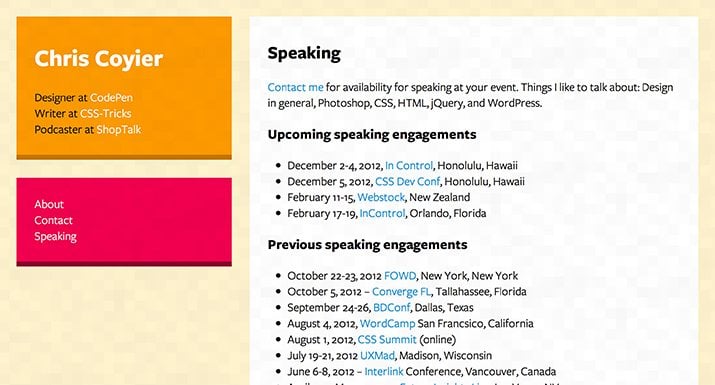5 Reasons to Start a Web Development Blog Today
It’s there, lost in your “someday” todo list, right under “spit off the Eiffel Tower.” One of these days, you’re going to start your own design or development blog. Is it really worth the effort though? Realistically, what can you expect to get out of such a venture?
As a full-time editor of multiple popular publications, I’ll share with you my top five reasons that you should start your own blog today. All five come from personal experience and I’m convinced that they’ll all be right in line with your personal goals.
1. Disciplined Learning
This is, by far, the most significant and measurable benefit of contributing daily or weekly to a web development blog. You might think that you shouldn’t write about web design until you’re some sort of enlightened guru who can answer any question, but the truth is, even those of us who do this for a living haven’t really reached that status.
We design and development bloggers don’t intuitively understand all the things that we write about. There’s no magic encyclopedia in our heads issuing forth previously unexplored wisdom and knowledge to the eagerly awaiting masses. Instead, all of the posts that you see on all these design blogs, at least the good ones, are the result of hours of research and preparation.
Photographer: brewbooks
Write About What You Don’t Know!
When I first began to write for Design Shack, I attempted to cling very closely to the golden rule of writing: “write about what you know.” Unfortunately, it wasn’t long before this left me staring at an empty page with absolutely nothing more to share.
As a result, I was forced to adopt a new idea: “write about what you don’t know.” Using this practice, I choose topics that confuse me. Instead of regurgitating what I’ve read everywhere else, I look for ideas that I’ve never read about with the assumption that I’m not alone. If the topic is hazy for me, I’ll bet others struggle with it as well!
Learning Begins Where Your Knowledge Ends
Once I adopted the technique of writing about the things that I didn’t know about, I found that my learning accelerated at an amazing pace. I was forced to dig deeply into topics that I had previously swept over, reading just enough to get by.
The best (and worst!) thing about writing articles for the web development community is that, if you don’t know what you’re talking about, you’ll get called on it. Commenters can be pretty nasty and have a way of attacking your self-esteem so brutally that you swear you’ll never use the wrong clear fix again!
When you’re up against this type of pressure, the situation becomes pretty much just like school. You research, revise and fact check until your eyes are bleeding in an attempt to get a good grade. By the time you hit that publish button, you’re an expert on that topic.
Professional Development Rocks
You’ll find that, even when you do write about topics that you’re knowledgable in, this quest for perfection will still ensure that you learn a thing or two.
Let’s be honest, the older we get and the more years we’ve been doing this, the harder it is for us all to find the time to sit down and learn new skills. Heck, it’s hard enough trying to keep our current skills relevant.
The benefit here is that blogging actually makes this easier. In addition to being more thorough than you normally would, you’ll find that your retention goes way up. Reading is all well and fine, but when you write about something, it has a way of sticking in your brain.
2. Driving Traffic to Your Site
“If you snag enough traffic, you’re bound to attract some individuals and even companies looking to hire someone with your skill set.”
Be honest, this is the one you’re interested in, right? You have a web design and/or development portfolio and you want a good way to get it a little extra attention. Is a blog a good way to go for this?
The answer is of course, “absolutely.” Paul Boag puts this idea into practice with Boagworld, a blog and podcast that exist to help drive traffic to Headscape, his commercial web development firm.
How Much Traffic Are We Talking?
Is a free web development blog your design firm’s ticket to wild success? Probably not. Let’s remember that a large part of your audience will likely be designers and developers just like you. In fact, they’re your competition!
That being said, if you have great content (and that’s a huge “if”), then lots of people could potentially end up seeing it. Just remember that, unless your ultimate goal is to sell ads and make money, traffic really isn’t an end in itself. The point is to leverage that traffic to earn more clients. Fortunately, if you snag enough traffic, you’re bound to attract some individuals and even companies looking to hire someone with your skill set.
Plan Content Around Your Goals
If your goal with blogging is indeed to earn more clients, then brainstorm some ways that you can tailor the content toward that goal. For instance, if you specialize in WordPress sites, write as much as you can about WordPress. This way, the people reading your posts are those who are interested in what you offer and might just end up hiring you do some work.
3. Contributing to the Community
Most, if not all, of my education in this industry came at zero cost to myself. The amount of freely available and well organized information regarding web design is mind-boggling. I paid thousands of dollars for a degree in business and didn’t learn half as much practical information as I can find on my favorite blogs in a given month.
I am profoundly grateful for those who went before me, taking the time to build a community that is amazingly easy to thrive in. Because of this history, I owe the web development community a sincere debt of gratitude. Writing daily posts for Design Shack has been a great privilege in that it provides me with an opportunity to give back to the greater community and help keep the road smooth for my peers and those who will come after us.
If your path from novice to professional has been similar to mine, then it’s time to stop being merely a consumer and try your hand at being a producer. Don’t set out to be famous, instead reach for the very attainable goal of helping someone master a skill that will enable them to earn a living.
4. Gaining Notoriety
Humanitarianism is awesome, and we have it pretty much covered in the previous point, but there’s also something to be said for making a name for yourself.
If what you have to share is truly valuable, and you’re consistently pushing out high quality content, then people will begin to notice (there’s more to it than that of course, but not much). As this happens, it’s not uncommon to find that your name begins to carry a little weight. Thousands of people have read and seen your work and they respect you as a professional and look to you as an authoritative source.
It’s All About the Benjamins
This isn’t just good for your ego! It actually leads to new professional opportunities. Guys like Paul Irish, Chris Coyier and Jeffrey Zeldman are regularly approached with speaking and publishing opportunities.
I’m a big fan of finding as many ways to earn a living as possible and with a little bit of “nerd fame,” you’ll find that your options will be opened up considerably.
5. Beefing Up Your Writing Skills
Like it or not, in this industry and just about every other, people will judge you based on the way you communicate, and in a digital world, this goes way beyond a firm handshake and a friendly smile.
I firmly believe that written communication is one of the most valuable skills that you can possibly obtain (right under being able to kick a sixty yard field goal). Whether you want to be a designer, nuclear physicist or a babysitter, you’ll find that being able to clearly communicate via written word will make your climb to success much easier.
Do Something Regularly and You Can’t Help But Improve
There are only two steps that one must take to become a quality writer: read a lot and write a lot. Given the amount of research and explanation involved in writing about a technical subject like web development, your blog will hit both of these steps in one go.
Even an informal, conversational blog will provide you with a fantastic place to hone your writing chops. The improvement here doesn’t even have to be intentional, the simple fact is that the more your write, the easier it will be to fill the screen with your thoughts.
But I Don’t Write No Good!
If you currently half low self esteem when it comes to written communication, great! You’re a perfect example of someone who needs a reason to begin writing regularly.
It’s true that some people possess an innate ability to capture a reader’s attention, but those people, as well as the rest of us, have to work hard to hone that ability. Want to know how they do it? You guessed it, by writing frequently.
Bottom line: if you can’t write, it’s your own fault. Fix it and stop making excuses. Trust me, you don’t have to be Chaucer to teach people how to write a little HTML.
Go Get Started!
I’m positive that at least one or two of these fives reasons to start your own blog hits you right at home, if not all of them. From here I give you two additional pieces of advice.
First, begin right away. Believe me, you’ll never have time and you’ll never know enough, so toss out those as reasons to wait. If you can’t manage this now, you’ll never be able to pull it off.
Next, if you’re not willing to really put forth some self discipline, then you’re wasting your time. Set up a regular schedule and stick to it, come hell or high water. Don’t make it a goal to blog “when you have free” time or “once in a while,” that’s a sucky goal and you know it. Daily posts are going to be tricky if you have a full time gig already, so I recommend shooting for one to two posts per week to start. One measly post per week. You can pull that off, right?
Go on, get to it. Tweet us once you get your first post up and, if we like it, we’ll share it with our followers.
Awesome stock photos provided by BigStock.



